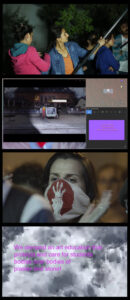18:00 Screening
19:00-21:00 Discussion (en/fr)
Online via zoom: https://zoom.us/j/96370756191
No registration
FERAL TV is a series of videos commissioned for »Interflugs 30: feral methods« representing current political and educational struggles.
Members of all five contributing collectives will be present for the screening and a discussion: Mon Autre École / Madrassati Nafidati (Algiers), #FreeSFZE (Budapest), Anonymous art students (Copenhagen), Polizeiklasse Dresden and the Rojava Film Commune.
Video activism by and for students was an urgent and practical response to the need of sharing information between students at the different universities (TU/FU/HdK) in Berlin during the student strikes of 1988/1989. The Videozeitung
is one of the projects from which Interflugs emerged, and it established access and knowledge-sharing for the medium of video long before the institution even considered it.
Five collectives accepted our invitation to produce their own version of a video journal and pick up on the tradition of self-made media and journalism as a tool of empowerment. All groups share a resistance against authoritarian control and right-wing forces of governance. The way each group forms and structures their own organisation reflects what they are fighting for. self-organisation, collective labor, creativity and performative tactics are the accumulated modes of defiance.
The members of feral methods, together with the five groups, will discuss the different video works created by each Feral TV collective and the various ways that video and visual communication have played a role in performative tactics of fighting for justice on the local scale. What can be learned from each collective and their modes of organizing and the challenges faced to collective structures and activism?
——-
In Budapest, the group #FreeSFZE is fighting for the independence of artistic teaching from the cultural nationalist policies of the Orbán government. The University of Theater and Film Arts (SZFE) Budapest has been occupied by students since the democratically elected bodies of the university were stripped of their power by a state-appointed commission in late summer 2020.
The Rojava Film Commune is a collective of filmmakers founded in 2015 and based in the autonomous region of Rojava. The Commune tasks itself with mediating and depicting the daily struggles in the Syrian war and Rojava’s collective attempt to build a new society. The Commune also runs the Rojava Film Academy, which offers one-year courses in Kurdish language and international film history, film theory, and all the stages of film production, taught by local and international film professionals. The structure of the Academy is horizontal, thus allowing the students to co-organize it.
Mon Autre Ecole / Madrassati Nafidati is a school collectively run by artists and educators in Algiers, Algeria. The school runs on a solidarity-based financing model and allows students who drop out of the rigid Algerian school system to complete their education. The school is not only a place of learning, but also a center of artistic and political debate.
Polizeiklasse Dresden is a collective of artists that emerged from the Dresden University of Fine Arts in 2019 on the occasion of the tightening of the Saxon Police Law. In their work they deal with authoritarian state power, fascism and the New Right, mostly in public space, using elements of civil disobedience, installation, theater and performance.
The Anonymous art students Copenhagen group was formed in response to recent events at the Royal Academy of Fine Arts in Copenhagen. An anonymous group of artists published a video documentation of a performance in November 2020, which points to the intertwining of the trade in enslaved people with the genesis of the art academy. The head of the theory faculty, Dr. Katrine Dirckinck-Holmfeld, claimed responsibility for the video and immediately lost her job. A criminal investigation is still ongoing and a right-wing backlash overtook the university.


